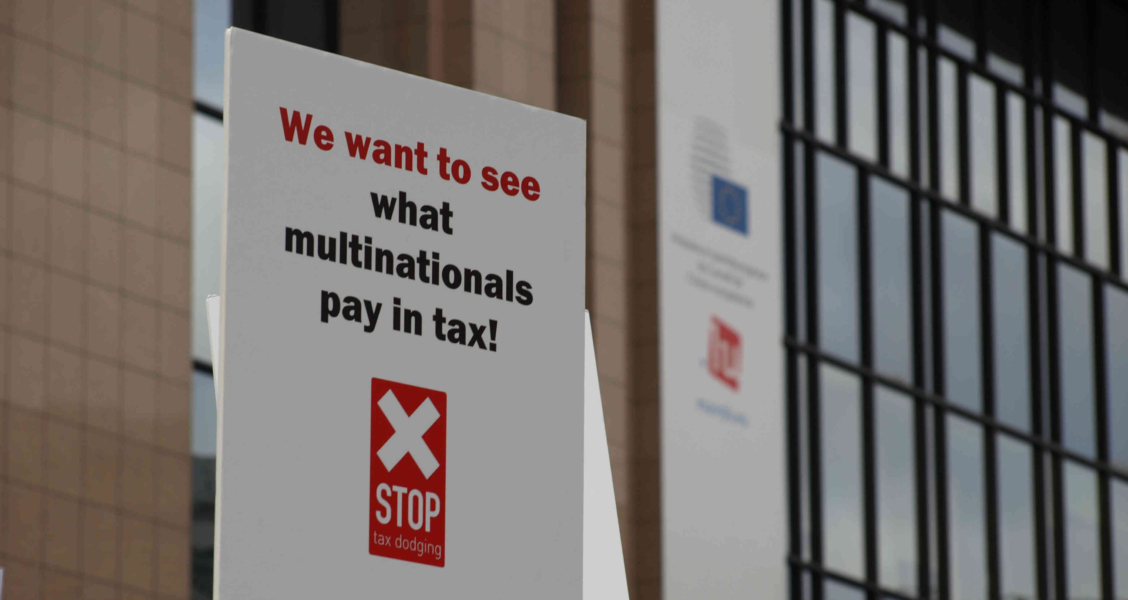The LuxLeaks revelations showed the world that many multinational companies had special tax arrangements with Luxembourg with the goal of lowering their global tax bill. In the time since, despite strong rhetoric, the EU has made little in the way of progress on real corporate tax transparency. The European Commission’s long-awaited leaked draft proposal fails to deliver and is a parody of transparency.
Tax transparency is vital to ensure that details of multinationals’ activities, locations and payments to governments are public. That way citizens, journalists and civil society can ensure that corporations contribute to the societies where they operate and mitigate corruption and money laundering risks. After several major corporate tax avoidance scandals in Europe and increasing pressure from civil society, the European Commission has been working on a proposal to bring about public country-by-country reporting (CBCR).
Public CBCR means that multinationals have to provide a geographical breakdown for their basic financial information in their annual reports. This information includes where they have subsidiaries, how many people they employ, the profits they make and what they pay in taxes.
In July 2015 the European Parliament proposed a welcomed amendment on public CBCR to an existing directive. However, the Commission, claiming it needed time for a public consultation and impact-assessment, has since taken eight months to come up with a toothless and ineffective piece of legislation. Far weaker than what the Parliament proposed last summer. On March 21 a leaked draft proposal was published.
Below we set out how the draft proposal falls short of what is needed for real tax transparency.
- According to the leaked draft, companies will only be required to publish information on a country-by-country basis for activities in EU Member States. For the rest of the world, including tax havens outside the EU, companies will only have to disclose an aggregate figure which undermines the legislation. Multinationals will still be able to shift their profits outside the EU without anyone being able to monitor where they are located, what they are doing and what they give to governments in the form of taxes or other payments. If a CBCR system only applies to 28 countries and leaves out 168, it cannot be called CBCR. This is EU zone reporting at best.
- This legislation will only apply to companies with an annual turnover exceeding €750million, only covering 10-15% of multinationals, according to OECD estimates. This is huge compared to the €40million turnover proposed by the European Parliament and to the existing EU rules for the extractive and logging sectors. Not only is this inconsistent with the EU’s own definition of “large undertakings” but it would leave out many companies. It would only apply to 1,053 EU listed companies, which represents a mere 0,004% of companies registered in the EU. What’s more, existing evidence demonstrates that multinationals of smaller sizes also engage in questionable tax practices such as the Paladin case in Malawi.
- The information which multinationals will have to disclose, once the intra-EU requirement and the threshold on the companies’ size are met, is very limited and far less than what is in the current amendment to the Shareholders’ Rights Directive. What’s missing from this proposal are assets, sales and purchases, public subsidies received, and a list of subsidiaries. We have strongly advocated for the inclusion of both public subsidies and payments to governments in the legislation, as these are important elements to raise flags on potential corruption cases and collusion between governments and corporations.
With this draft legislation the Commission has effectively managed to come up with a new creative form of country-by-country reporting without the country-by-country element.
If this is the final draft that the Commission will present on April 12, which will then go through the EU legislative process, this law will not achieve its intended objective. There is still time for the Commission to alter the proposal in the coming weeks and we strongly urge them to do so.
We call on the Commission to take the necessary steps in order to break the circle of rhetoric statements on transparency, and propose a coherent and effective EU legislation on public CBCR. Only then it will demonstrate it is seriously committed to ending the secrecy around multinationals.




